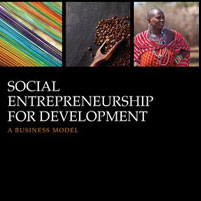Alumna’s Guide for Social Entrepreneurship
By Sarah Gutekunst (DC’17)

One thing Dietrich College of Humanities and Social Sciences alumni know for certain is that their education prepares them for almost anything.
Meg Brindle (DC’92), who received a Ph.D. in applied history, left a tenured position at George Mason University to Africa to explore and address root causes of poverty rather than just the symptoms.
Brindle began work with the Maasai women of Kenya and Tanzania, known for their quality shea butter, and discovered that they receive much less for the export than retailers make from consumers. With the help of a $1.25 million grant from the United States Patents and Trademarks Office, she developed workbooks and training materials in Maa, the Maasai language, to get the women thinking more like entrepreneurs. The training has been rolled out in Kenya, Tanzania, and Ethiopia.
Later, Brindle partnered with Ron Layton, a fellow with social entrepreneurship non-profit Ashoka, to distill her years of knowledge and training into a new textbook. Published by Routledge, “Social Entrepreneurship for Development: A Business Method,” describes “a six-step model for developing an IP business positioning strategy that allows developing country producers to position themselves better as owners of retail brands in foreign market countries.”
Brindle, emphasizing the efficacy of the method as a whole, warned, “You don’t want to leave out any steps or you don’t bring the income all the way back to the farmer/producers who typically receive three percent. The gain accrues to the business on the wrong side of the supply chain.”
The methods are:
- Start with distinctive products that hold IP value
- Create a stakeholder organization, like WONS (Women’s Owned Nilotica Shea)
- Create the right IP tool
- Enable ownership of the supply chain, giving producers majority rights in the export company
- Brand and position effectively
- Engage social impact investors
In one case assisting Ethiopian coffee farmers, Brindle and Layton’s method brought an increase of $101 million to the country. They’ve additionally conducted 20 feasibility studies which have shown the strategy’s potential to bring in an addition $100 million per product per year, or $1.4 billion increase in 14 products studied.
Brindle also noted that her training in policy history at Carnegie Mellon University has been both useful and inspirational and said “We never know where our paths will take us, but we do know CMU is a great preparation.”
Anyone interested in following the book’s social media campaign can follow Ashoka on Facebook and Twitter using the hashtags #Ashoka and #socent.